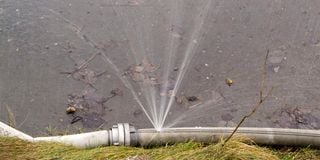Premium
Sh11.2bn lost annually to water theft, leaks

At least 45 per cent of water produced by water companies is lost through theft, leakages and wastage, costing the country Sh11.2 billion annually.
At least 45 per cent of water produced by water companies is lost through theft, leakages and wastage, costing the country Sh11.2 billion annually, a Senate watchdog committee heard on Tuesday (August 1, 2023).
The Water and Sanitation Providers Association (Waspa) revealed that the losses have left several water companies staring at insolvency.
Waspa Chief Executive Officer Antony Ambugo said the non-revenue water, which is produced but not billed, does not earn the companies anything. He explained that physical losses are through leakages and bursts in distribution and service pipes as well as overflows in water reservoirs.
“The losses have threatened the existence of the water companies, with most of them plunging into insolvency as county governments come to the rescue of others,” said Mr Ambugo.
The Waspa boss was speaking when he appeared before the Senate County Public Investments and Special Funds committee investigating the problems that water service providers are facing. Mr Ambugo told the committee led by Vihiga Senator Godfrey Osotsi that physical losses require huge capital outlay to address as they are as a result of dilapidated infrastructure inherited from past regimes. Commercial losses, he explained, emanate from illegal connections or water theft, meter errors, meter reading inaccuracies and unmetered connections.
“Commercial losses are a result of human culture and activities aimed at unmetered access to water services. It is a product of water users evading metering so that they can use water free of charge,” said Mr Ambugo.

Water and Sanitation Providers Association Chief Executive Officer Antony Ambugo (left) and Chairman Moses Kinya before the Senate County Public Investments and Special Funds committee at Parliament Buildings in Nairobi on Monday.
He added that water theft is perpetrated by customers from both low-income and high-income brackets, water vendors, public and private institutions, among others.
Just like physical losses, the Waspa boss said commercial losses, too, require heavy investment in smart metering and constituent technologies as well as behavioural and culture change among water firms’ staff and customers.
To ensure the water companies remain afloat, he urged the national government to allocate them conditional grants to cover the non-revenue water.
At the same time, Waspa asked county governments to allocate a reasonable percentage of their budgets for the utilities to manage their non-revenue water.
“The two levels of government should operationalise the Inter-Government Water and Sanitation Coordination framework to provide an avenue to jointly address the above challenges,” he said. The committee took Water Services Regulatory Board (Wasreb) boss Julius Itunga to task for performing county functions as water is a devolved function.
“Essentially, you are dealing in a devolved function but there is no representation of the county government. This is completely wrong,” Narok Senator Ledama Olekina said.
The Wasreb board comprises a chairman appointed by the President and four members picked by the Water Cabinet Secretary representing various agencies, but not the county governments.
The board charges the water service providers four percent of every amount they generate from the sales of the commodity.





